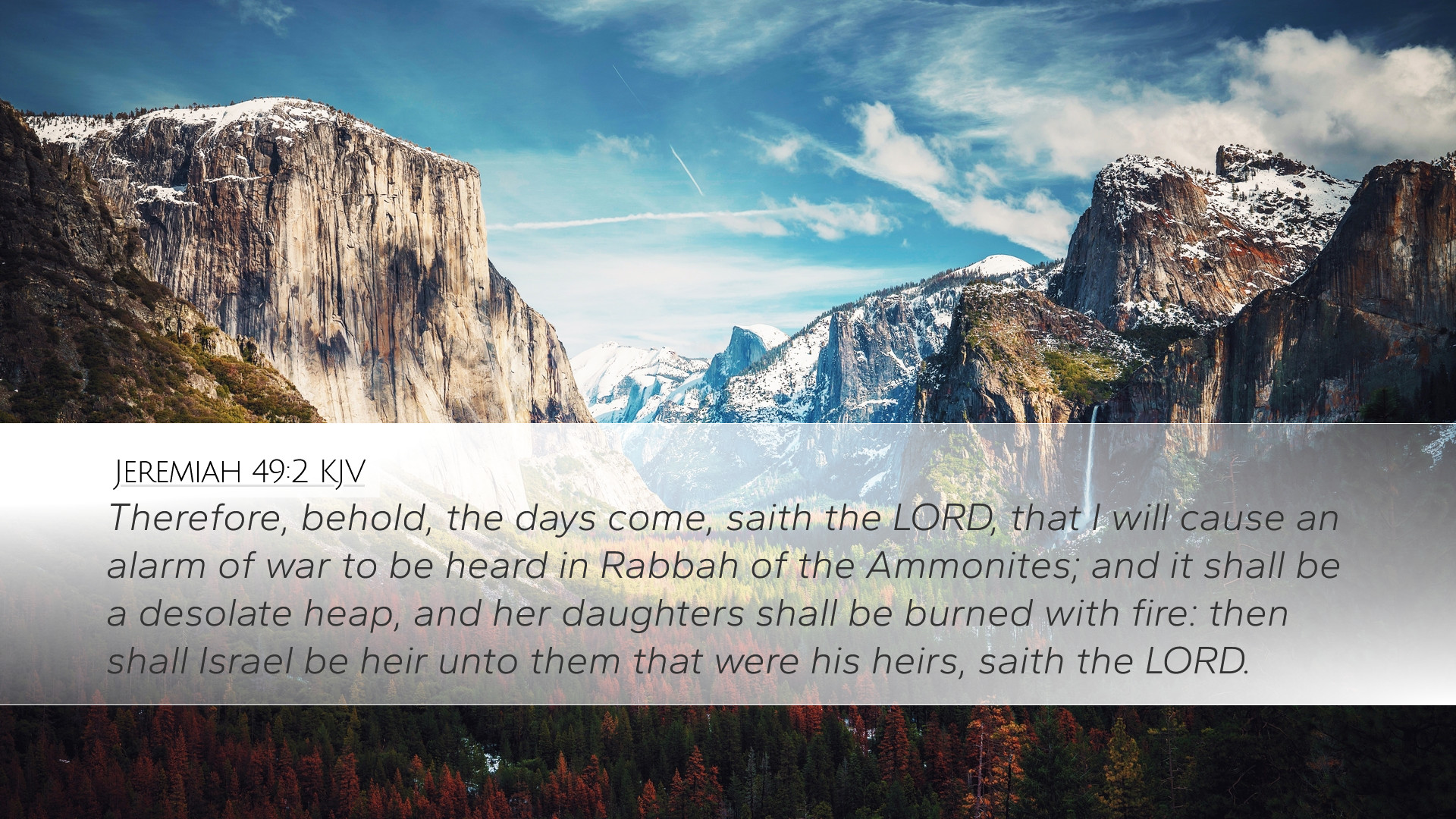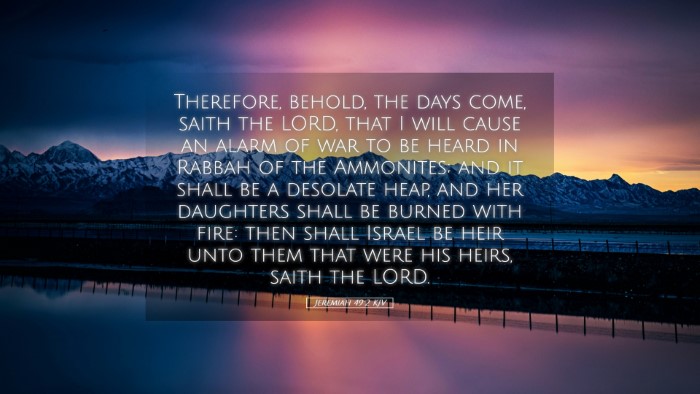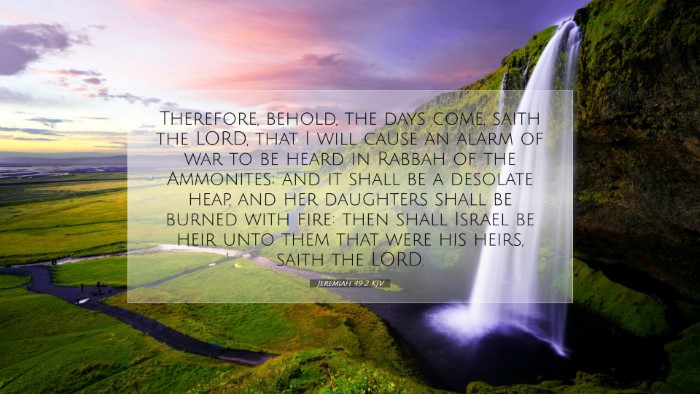Commentary on Jeremiah 49:2
Verse: "Therefore, behold, the days come, saith the LORD, that I will cause an alarm of war to be heard in Rabbah of the Ammonites; and it shall be a desolate heap, and her daughters shall be burned with fire: then shall Israel be heir unto them that were his heirs, saith the LORD."
Introduction
The prophetic message of Jeremiah 49:2 serves as a solemn reminder of impending judgment against the Ammonites, a nation often in conflict with Israel. This verse forms part of a broader proclamation concerning the fate of several nations surrounding Israel. The emphasis on war and desolation reflects the larger themes of divine sovereignty and justice prevalent throughout the book of Jeremiah.
Exegesis and Context
Before delving into the commentary, it is crucial to understand the historical and cultural context surrounding this passage. Ammon was situated to the east of Israel's territory, and throughout Israel's history, the Ammonites often engaged in hostilities against them. The prophecy focuses on Rabbah, the capital city of Ammon, signaling that divine retribution is imminent.
Insights from Matthew Henry
Matthew Henry emphasizes the certainty of God's judgment: "The prophecy is concise but weighty, indicating that the days are coming when God will act decisively against the Ammonites." He points out that the phrase "I will cause an alarm of war" signifies that God Himself orchestrates these events, heightening the sense of divine authority behind the prediction.
Henry elaborates on the description of Rabbah being turned into "a desolate heap," illustrating the complete devastation that is to come. He interprets this as a fulfillment of God’s promise to uphold justice and maintain His covenant with Israel, as they would ultimately inherit the lands of their enemies.
Insights from Albert Barnes
Albert Barnes contributes to the commentary by dissecting the elements of this prophetic declaration. He notes, "The alarm of war in Rabbah indicates the urgency and severity of the impending conflict." Barnes stresses the metaphorical implications of "her daughters shall be burned with fire," indicating not just physical destruction but a complete annihilation of Ammonite culture and identity.
Furthermore, Barnes highlights the theme of inheritance: "Then shall Israel be heir unto them that were his heirs." This statement underscores the reversal of fortunes, as Israel—once oppressed—would inherit the lands held by their adversaries, symbolizing God’s promise of restoration and blessing towards His people.
Insights from Adam Clarke
Adam Clarke brings additional depth to the interpretation by examining the linguistic nuances present in the text. Clarke states, "The word 'Rabbah' denotes both a city and represents a people, suggesting that the judgment is comprehensive and inclusive of all associated with the city." He connects this to the broader theme of communal judgment, wherein the actions of a few can lead to the downfall of many.
Clarke also addresses the significance of fire in biblical symbolism, noting that it often represents purification but, in this context, serves as a harbinger of total destruction. He warns that such calamities should act as a sober reminder of the consequences of straying from God's commands.
Theological Implications
The theological weight of Jeremiah 49:2 is profound. It serves as a potent reminder of God’s ultimate authority over nations and His commitment to justice. The passage teaches us about the seriousness of sin and the reality that nations, much like individuals, are accountable to God.
Moreover, this verse calls pastors and theologians to reflect on the themes of leadership and cultural influence. Just as the actions of the Ammonites warranted divine retribution, contemporary leaders and societies must heed the warnings of Scripture and the imperative to seek righteousness.
Application for Today's Readers
For modern audiences, especially pastors and students of the Word, Jeremiah 49:2 challenges us to consider the consequences of our actions, both individually and collectively. As Israel is promised restoration and inheritance, we, too, are called to recognize God’s grace and mercy in our lives.
Practical Applications:
- Look to God’s Sovereignty: Recognize that God remains in control of history and personal circumstances.
- Reflect on Cultural Fidelity: Consider how current actions align with God’s Word.
- Cultivate a Heart of Restoration: Encourage those around you to seek righteousness and restoration in their lives.
Conclusion
Jeremiah 49:2 invites us into a deeper understanding of the consequences of sin and the inexorable nature of God’s plans. The prophecies against the Ammonites serve not only as historical insights but also as timeless warnings and encouragements for those who seek to live according to God’s calling. Through the lenses of commentators such as Matthew Henry, Albert Barnes, and Adam Clarke, we glean valuable insights that call us to vigilance, reverence, and a commitment to pursuing justice as we await the ultimate fulfillment of God's promises.


